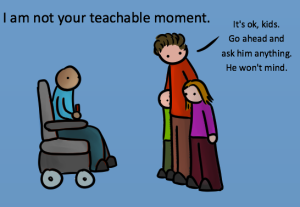
Source: Getty Images
I hopped into a friend’s car after attending a bridal shower last weekend, and ten minutes in, I realized I had left my phone.
Almost to the train, we turned around.
I apologized to the others and then looked out the window, embarrassed.
Inside, I was fuming, pissed at myself for causing an inconvenience to all of us.
What I wanted to do was apologize over and over, to say aloud, “That was stupid. I can’t believe I did that. I’m always leaving things. So sorry, you guys.”
Had I, they then would likely say, “Don’t worry about it. It’s no big deal.”
And I, of course, would repeat, “Really, I can’t believe I did that. I’m sorry.”
Because I think that’s the natural reaction that most of us have when we inconvenience people. We feel so badly for causing others anxiety that we think that apologizing (or over-apologizing) will somehow make it a little bit better.
But instead of engaging in the runaround, what I did was ask myself what the point of saying these things over and over again would be.
I mean, I had apologized once, the decision to turn around was made, and that was it.
I already felt badly, so why would I want to perpetuate that feeling by refusing to let it go?
The above scenario – and ones like it – is only one of many examples where there’s potential to be mean to ourselves about things we’ve done, said, or felt.
And often, when others do it (over-apologize or berate themselves), we pick up on it. For a lot of us, we might even find it annoying.
In my work as an editor, I’ve often coached others in the practice of intentional (or mindful) speech. And it’s always been relatively easy.
But over the last couple of years, I’ve made feeling good about myself a priority, which meant that I needed to start editing myself and that certain words and phrases needed to go – for my comfort, as well as the comfort of those around me.
Paying attention to how I talk is key to maintaining healthy relationships.
So here are some words and phrases I’ve tried to eliminate to help stay kind and gentle to myself.
1. I’m Sorry
This was the most common phrase I caught myself saying.
I’d run into someone in the grocery store, and I’d say “sorry.”
A friend would ask for a Band-Aid, and I’d say, “I’m sorry. I don’t have one.”
Or someone would call, and I’d be indisposed and say, “I’m sorry, but I can’t talk right now.”
At all points of the day, it seemed like I was apologizing for something.
At home, I sat on my couch and thought about how when I had lived in Madrid, there was a big difference between permiso, disculpe, perdón, and lo siento.
In Spanish, lo siento, which means I’m sorry, is only used if you’ve done something actually wrong, like step on someone’s foot.
But if you need to pass by someone, you’d say permiso or perdón, which pretty much translates to excuse me.
And if you need to tap someone on the shoulder for something, you’d likely say disculpe.
As I sat longer and thought about when I would say “I’m sorry,” I realized it was more of a reflex than it was connected to an actual feeling of sorrow or regret.
I was using “I’m sorry” in place of phrases like “excuse me” or “pardon.”
In English we should reserve “I’m sorry” for the same cases where one would use “lo siento.”
By using it incorrectly and often, what I was doing was making myself feel badly for no reason.
2. Should
Ever since I can remember, there has been a “should” in my life.
I should be studying more. I should be doing my homework. I should be married with kids. I should be more established in my career.
And on it goes.
The problem with the word “should” is that it passes judgment. It makes it seem like what I’m doing at this moment isn’t good enough.
And who says I should be doing all of these things anyway?
By using “should,” I give others the power.
So what I do now is substitute “could” where I would normally say “should.”
I could be doing my homework, but right now I’m…
I could be married with kids, but I’m choosing to…
I could be more established in my career, but I’m…
By replacing “should” with “could,” I start to see the reasons why I’m not doing certain things.
And that implies that I have a choice with what I’m doing and where I’m putting my attention.
Instead of passing judgment on myself, I start to understand where I’m putting my energy and in turn accept that the reason I’m not doing x is because I’m (happily) doing y.
3. That’s Just Not Who I Am
I used to say this phrase a lot.
I would say it when I didn’t believe in myself, when I felt stupid, or when I wanted to change and be more open and transparent, but was scared to try.
“I just don’t do math,” I would say. “It’s just not who I am.”
What I learned, though, was that I could do math. And I could be open and transparent if I wanted to be. But by saying “that’s just not who I am,” I was limiting my capability to be more.
I was putting myself into a box, assigning myself a category that became an obstacle to overcome.
I got in my own way, not letting myself be open to the possibility of another story besides the one I’d been telling myself year-after-year.
It was like stopping myself before I even began.
What I started to do was notice when the phrase would come up and then ask myself if the response was because I was feeling attacked or insecure, and then I’d ask if I wanted to be that kind of person.
I have to give myself the option to choose yes or no instead of cutting myself down from the start.
4. I’ll Let You Go
If I’m on the phone and ready to hang up, I always say, “Well, let me let you go.”
Or, “I’ll let you go.”
I do this because I’m the one who needs to get going, but I don’t want to hurt the feelings of the person I’m talking to.
But the truth needs to come out. Because saying “I’ll let you go” instead of “I need to go” implies that the other person has something more important to do than talk with me.
Nobody wants to feel like they aren’t a priority. So instead of making myself feel less-than, what I do is say exactly what I’m feeling:“I have to get going.”
5. I Always / I Never
“I always forget my…”
“How come I never…”
“I’m never…”
Any time “always” or “never” comes up in conversation, I take note.
I do this because most of the time, I’m offhandedly criticizing myself.
Both are finite. They imply that there is no way to change, and there are no options to choose from.
By using “always” and “never,” I practice and learn that change is impossible.
I let my insecurities and self-doubt keep me in the same negative pattern, setting myself up for failure each time.
The less I use limiting words, the more I open myself up to becoming whomever it is I need and want to be.
—
By cutting certain words and phrases out of my vernacular, I’ve created more space for more positive thoughts and feelings.
Letting go of limiting speech has helped me like myself more – because now I’m not criticizing who I am at every turn. And that’s helped me make myself a priority.
Paying attention to how you use your words is core to keeping the relationship you have with yourself healthy and accepting.
If you notice yourself saying certain words and phrases over and over, look to see if they are keeping you in the same limiting belief pattern. If so, try cutting them for a week and see if you feel lighter.
It worked for me.
Want to discuss this further? Login to our online forum and start a post! If you’re not already registered as a forum user, please register first here.
Cynthia Kane is a Contributing Writer for Everyday Feminism. Over the last year and a half, she’s relearned the following: how to jump up and down when she’s happy, cry when she’s sad, laugh when something’s funny, take a compliment, smile at strangers, and be open to the fact that everyone is going through it all the time. For more, visit her website or follow her on Twitter @cynkane. Read her articles here.
Search our 3000+ articles!
Read our articles about:
Our online racial justice training
Used by hundreds of universities, non-profits, and businesses.
Click to learn more




















